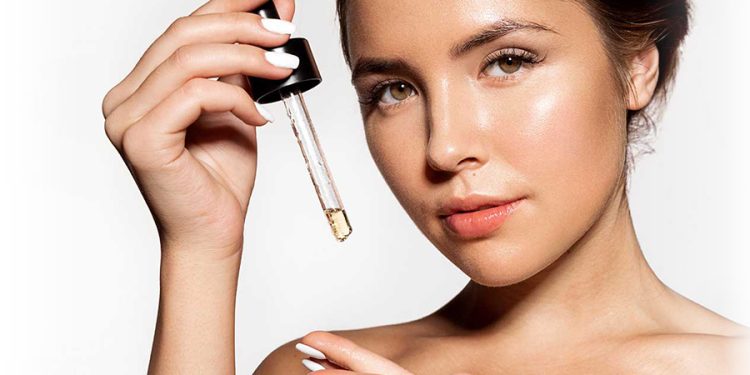Having dehydrated skin that is also oily and prone to acne can be extremely frustrating. Once you understand what's going on with the underlying triggers and which products to use (and which to avoid), you can put together an ideal skincare routine to start seeing results. Here I have discussed some routine help for dry, dehydrated acne-prone skin.
First, you must understand that dry skin is more than just a cosmetic issue; you must also examine your diet. This is why I included skincare and diet recommendations. Whether we like it or not, the hormones and what we eat impact our skin more than what we apply.
Estrogen, for example, will naturally plump and moisturize your skin. All that said, let's get to know what causes dry and dehydrated skin first to fix these issues the best we can.
Dry Dehydrated Skin
TransEpidermal Water Loss (TEWL), or water loss from the skin, is continuous. Your skin constantly loses water, replaced by the water you eat and drink. WATER is what keeps your skin moisturized. Lipids (oily substances in the skin) help keep moisture in your skin.
Healthy skin has mechanisms for slowing down this terrible water loss: Sebum and a strong skin barrier. The skin barrier is the skin's surface layer, made up of dead skin cells, and they prevent water from escaping and unwanted substances from entering your skin (and bloodstream).
Sebum, a waxy, oily mixture, is also present to slow the evaporation of water from your skin into the environment. When the air is dry in our surroundings (due to a harsh winter, air conditioning, etc.), water molecules will naturally move from where they are abundant (your skin) to where there are few (the air around you). This is why your skin becomes dry during this time of year, even though it isn't normally dry!
Let's get right into how to treat dry winter skin naturally!
Use Moisturizers Occlusives and Humectants
To counteract the extreme loss of water from your skin, you must replenish it with a large amount of moisture (and humectants to keep it there) and then LOCK IT IN with an effective occlusive. Occlusives work by creating a breathable layer on your skin that traps water inside, keeping your skin moisturized. Rosewater is great for adding moisture and soothing the skin.
Avoid Harsh Cleansers
Is your cleanser drying out your skin? As if you have to apply a moisturizer right away, or your skin will become itchy?
Is your cleanser excessively foamy?
If yes to any of the queries above, a super gentle, pH-balanced cleanser can help your dry skin more than any moisturizer!
Avoid high linoleic acid oils.
Rosehip oil, hemp oil, and grapeseed oil, high in linoleic acid, are NOT suitable for dehydrated skin. This is another typical blunder people mostly come across. But I know; there is plenty of information on the internet about how moisturizing they are.
They are perfectly safe when used with a moisturizer, but not independently. Those oils contain linoleic acid that emulsifies the sebum, which can cause your skin to dry out. It also functions as a weak DHT blocker, reducing sebum production even further. This is fantastic if your skin tolerates oils and you have oily skin! However, if your skin is dry, avoid using it.
Cold Water Humidifier
As I said above, how the dry air around you absorbs moisture from your skin?
One helpful method to solve this problem is to add more moisture to the air, which slows down the TEWL.
A cold water humidifier maintains optimal humidity in the air and can make a significant difference in your skin, particularly during the cold winter months. This is more effective than you might think!
You can turn it on for an hour before going to bed, along with lavender essential oil. You can also set it to 6 hours in your bedroom if the air is arid and wake up with beautiful dewy skin!
If you don't want to use the humidifier, here are a few alternatives:
- Place a bowl of water near a heat source.
- Use a spray bottle to mix water with 5-6 drops of your favorite essential oil and spray around the room to increase the moisture in the air instantly. It will also smell fantastic!
Avoid Hot Water
Water on your skin is much drier than water inside your body. Hot water, in particular, has been heavily chlorinated. Avoid allowing the water stream to fall directly on your face when showering. This is too harsh on your skin and will cause micro-tears and dryness.
Don't let your face wet in the bath or shower, as well as use excessive amounts of water on your face in general. You can use rose water toner on a cotton pad instead of splashing water on your face whenever possible.
These all were just a few tips for dry, dehydrated acne-prone skin to add to your routine. If you want expert advice at home, you can get an online consultation with a skin specialist. You can visit Marham and book your appointment with the Best Dermatologist if you want expert consultations.
However, aside from expert home advice, several premiere skin clinics provide facial rejuvenation treatments and other skin care solutions to people with specific skin problems. Skin centers like Liberty Belle Skin Care utilize advanced non-surgical cosmetic technologies and high-quality services to ensure the ultimate skincare experience for their clients. Hence, if you think your dehydrated skin needs professional assistance, check out the best skincare center around you and get the best treatment for your precious skin.
FAQs
1. Is acne more prone on dehydrated skin?
Unlike dry skin, which is less prone to acne due to a lack of oil, dehydrated skin is a breeding ground for acne due to excess oils.
2. Is vitamin C serum beneficial to dry skin?
Sunburn, photoaging, hyperpigmentation, wrinkles, sagging, dryness, and uneven skin tone are all problems that vitamin C can help prevent.
3. What is the best method to moisturize oily, dehydrated skin?
Cleansing with a gentle cleanser and applying a hyaluronic acid serum before applying moisturizer. This is a highly effective way to replenish dehydrated skin and aid in moisture retention, keeping skin soft and pillowy.
























